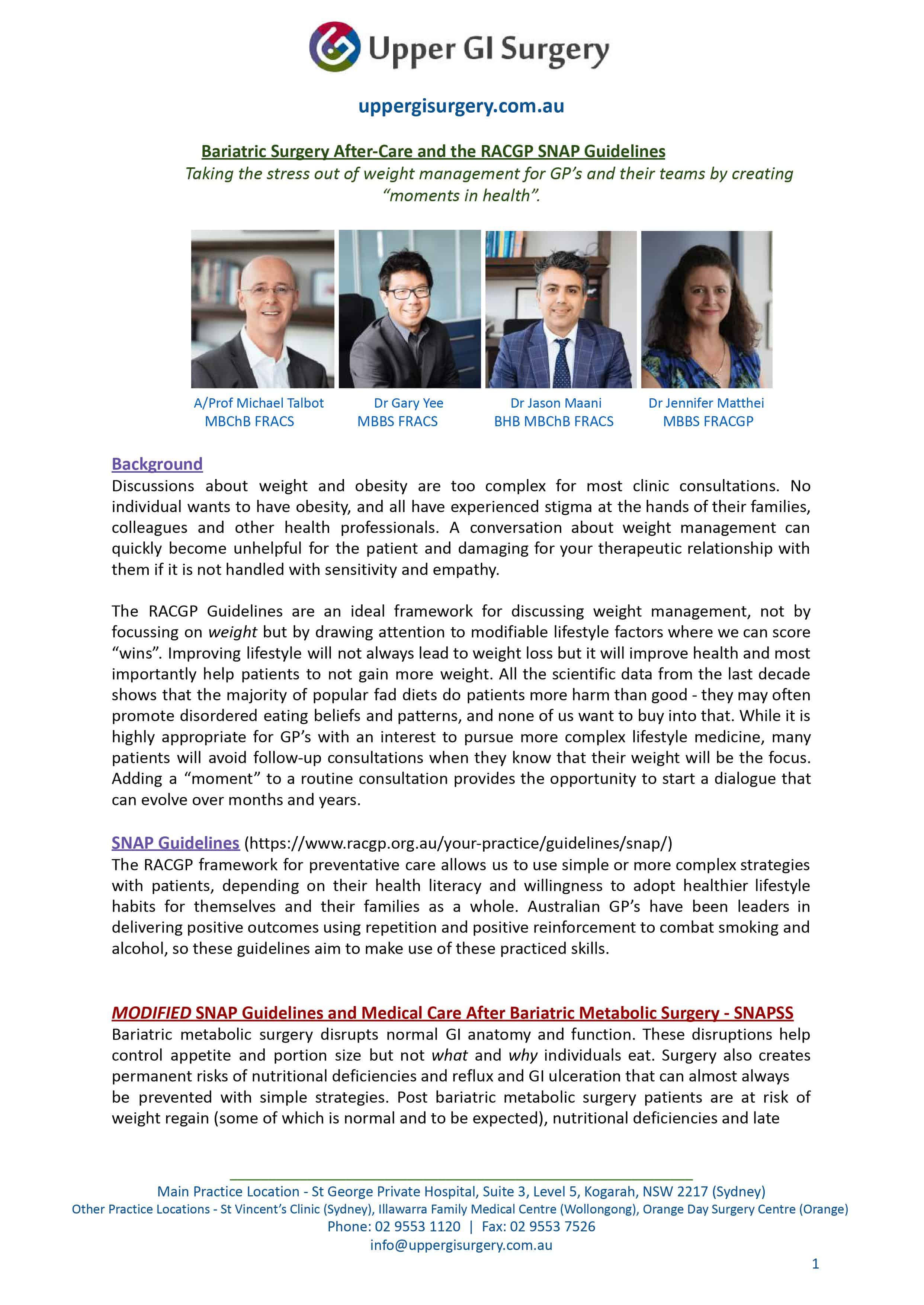Background
Discussions about weight and obesity are too complex for most clinic consultations. No individual wants to have obesity, and all have experienced stigma at the hands of their families, colleagues and other health professionals. A conversation about weight management can quickly become unhelpful for the patient and damaging for your therapeutic relationship with them if it is not handled with sensitivity and empathy.
The RACGP Guidelines are an ideal framework for discussing weight management, not by focussing on weight but by drawing attention to modifiable lifestyle factors where we can score “wins”. Improving lifestyle will not always lead to weight loss but it will improve health and most importantly help patients to not gain more weight. All the scientific data from the last decade shows that the majority of popular fad diets do patients more harm than good – they may often promote disordered eating beliefs and patterns, and none of us want to buy into that. While it is highly appropriate for GP’s with an interest to pursue more complex lifestyle medicine, many patients will avoid follow-up consultations when they know that their weight will be the focus. Adding a “moment” to a routine consultation provides the opportunity to start a dialogue that can evolve over months and years.
SNAP Guidelines
The RACGP framework for preventative care allows us to use simple or more complex strategies with patients, depending on their health literacy and willingness to adopt healthier lifestyle habits for themselves and their families as a whole. Australian GP’s have been leaders in delivering positive outcomes using repetition and positive reinforcement to combat smoking and alcohol, so these guidelines aim to make use of these practiced skills.
MODIFIED SNAP Guidelines and Medical Care After Bariatric Metabolic Surgery – SNAPSS
Bariatric metabolic surgery disrupts normal GI anatomy and function. These disruptions help control appetite and portion size but not what and why individuals eat. Surgery also creates permanent risks of nutritional deficiencies and reflux and GI ulceration that can almost always
be prevented with simple strategies. Post bariatric metabolic surgery patients are at risk of weight regain (some of which is normal and to be expected), nutritional deficiencies and late side effects/complications. The SNAP guidelines are an appropriate way of helping these patients manage their weight and health after surgery.
Smoking and NSAIDs – cause GI ulceration and a substantial risk of these ulcers perforating. PPI therapy will minimise this risk so if a patient cannot or will not cease these agents then a PPI prescription is strongly advised.
Nutrition – Surgery will help patients control their intake of food at mealtimes but not snacks, sweets and liquid calories. Encouragement to focus on prepared food (rather than purchased food) with a high nutritional value, and normalisation of eating behaviour, is the same for bariatric metabolic surgery patients as for the rest of us. Active maintenance strategies are critical for all patients who have undergone bariatric metabolic surgery, including the need to weigh themselves weekly. Patients who abandon this strategy will all regain more if not all of their lost weight and reverse the health benefits they experienced.
Alcohol – Alcohol is more rapidly absorbed after bariatric metabolic surgery so is potentially more addictive. It also creates injury to the GI tract and causes ulceration. Regular drinking (more than 1-2 serves, more than 2-3 times per week) creates a real risk of substantial harm to weight loss surgery patients who will need a PPI prescription and alcohol reduction strategies. It is reasonable to consider reversal of surgery in patients who struggle with alcohol addiction.
Physical activity – Sedentary behaviour is strongly correlated with snacking, weight regain, bone loss and fracture risk. Bariatric metabolic surgery patients benefit from the same minimal exercise targets as other patients; for those who have risk factors for osteoporosis, the initiation of calcium + vitamin D supplementation in addition to weight bearing and resistance exercise would be recommended. This is again another situation where referral to an exercise physiologist may/should be considered.
Supplements – All bariatric metabolic surgery patients need a daily multivitamin as a minimum and yearly blood tests as a minimum. They have all been given advice about what they need to take, however many forget this advice or decide that they don’t need the supplements any more. The risk of nutritional disturbances is > 50% in all patients within 2-3 years of having surgery. A daily multivitamin containing thiamine, folate and copper may not fix every problem, but it makes life or organ-threatening complications unlikely. A patient who eats a high-quality diet and is clinically well will be OK with yearly bloods checking Folate, B12, Iron, Vitamin D and PTH. 2-3 yearly bone density scans will be suitable for some patients depending on their overall risk profile.
Symptoms – Side effects from surgery are common and can be a sign of underlying and potentially progressive pathology. Reflux, regurgitation and vomiting are not expected effects of surgery. A simple rule of thumb is that any patient with reflux that is not “cured” by a PPI must be referred to a Bariatric specialist for assessment. Abdominal pain severe enough for patients to request strong pain relief requires similar action. Most general surgeons and gastroenterologists are not trained or experienced in diagnosing or managing these problems – our office is happy to provide advice on an urgent basis, even for patients who have not previously been treated at our practice.

